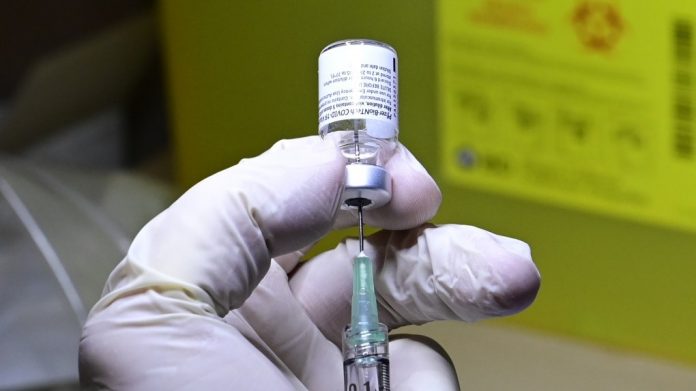Paramedics and emergency medical responders are now among Alberta’s eligible frontline workers to receive COVID-19 vaccines, though on Monday the premier addressed his concerns for the province’s dwindling supply of doses.
The province is now in a position to administer volumes of vaccine that outpace the number of doses Alberta is receiving, Premier Jason Kenney said during a Monday news conference. Emergency medical crews are being added to the list despite this because of the critical role they play in frontline health care.
“All I see is red on our projections from the week of January 18 to the week of March 29. The red represents a shortage of supply,” said Kenney.
“Next week, we’re projecting to be short at least 20,000 or more based on our pace of inoculations.”
Alberta is expected to have received 677,000 doses of the Pfizer and Moderna vaccines by the end of March.
By the end of day Sunday, 46,791 doses of the vaccine had been administered in Alberta. Kenney expects another 3,200 people to receive the vaccine by Monday evening.
The province has the capacity to be administering 3,800 doses per day, Kenney explained, adding that more than three-quarters of Alberta’s stock is now in people’s arms.
There have been seven adverse events following immunizations which were mostly minor, such as swollen lymph nodes, upset stomachs or rashes. Three of the events involved an allergic reaction, though none were anaphylactic, Alberta’s chief medical officer of health Dr. Deena Hinshaw explained.
“The current overall adverse event rate per 100,000 doses for COVID-19 vaccine is roughly comparable to the rate for pneumococcal vaccines,” said Hinshaw. Only eight adverse events have been recorded this year from just under 31,000 doses of the pneumococcal vaccine.
“Allergic reactions can happen with any medication, vaccine or even food. Being ready to respond to an allergic reaction is a critical part of every immunization program,” Hinshaw said, adding that this is the reason people are asked to stick around for a short time after any inoculation.
Long-term care and supportive living residents across the province are expected to have all received their first dose by next week, Kenney said.
Second shots are scheduled to start next week for those who have waited enough time between doses.
Official Opposition Leader Rachel Notley called for further transparency from Kenney and the vaccine task force, including daily briefings from members of the task force, so people can access information on the progress of immunizations among at-risk groups, vaccine distribution at sites with outbreaks and updates on storage and transportation.
“The premier is big on projections but as we now know, it doesn’t always turn out the way he promises. And when it goes sideways, he disappears. That’s why we need daily reports on the actual performance from public officials who are tasked with this job that is so important,” said Notley.
“Albertans have a right to these daily updates on the progress of this critical, critical work.”
More than two in five Albertans say the province is doing a “bad job” on COVID-19 vaccine distribution, according to Angus Reid Institute survey results released Monday, which is in line with how other provinces are feeling about their own governments.
However, 20 per cent, or one in five, Albertans outright say they will not be vaccinated. This is more than double how many say they’ll refuse the vaccine in British Columbia and Ontario — where just eight per cent of people in each province say they intend to deny getting it.
Across the country, 60 per cent of Canadians say they are willing and waiting to be immunized as soon as possible — a 12 per cent increase from a month ago. But 52 per cent say their expected wait-time to be vaccinated is “too long.”
Health Minister Tyler Shandro reminded people of the importance to continue upholding public health measures.
“I know that it’s been a long and difficult few months but we can’t stop until all of us are protected. And we are working as fast and as efficiently as we can to make sure that that is exactly what happens,” said Shandro during the news conference.
































